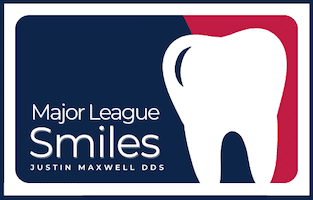Dr. Justin Maxwell offers modern tooth replacement options that look and feel completely natural. Whether you’re missing several teeth or a whole arch, today’s dental technology can give you back your smile in no time. Restorative treatments like implant-supported dentures don’t slip around or cause discomfort. These secure firmly in your mouth so you can eat, talk and laugh with confidence again.

Dentures in Ellicott City, MD
Finding the perfect denture for your smile is a big decision. Dr. Maxwell will help you choose what works best for your life and your mouth. During your consultation, he’ll consider things like your daily habits, health history, and the state of your remaining teeth and gums.
We offer three main types of dentures:
- Full Dentures: These replace all your upper or lower teeth, or both. They rest on your gums and stay in place with natural suction or denture adhesive. While they’ll help you eat and speak better, they might need occasional adjustments as your gums change shape over time.
- Partial Dentures: Great if you’re missing several teeth in a row. These clip onto your remaining teeth with small metal attachments. Made from a mix of metal and acrylic, partials keep your other teeth from shifting while improving how you chew and talk.
- Implant Dentures: The most stable option for full arch replacement. Dr. Maxwell can anchor these dentures to dental implants in your jaw. They won’t slip or move, feel comfortable, and give you the closest feeling to having your teeth back.
All our dentures are custom-made to look completely natural, so no one will even know you’re wearing them.
The Process of Getting Dentures
The first step in getting dentures is a thorough exam. Dr. Maxwell will assess your oral health and discuss your options. He will also take X-rays to better understand your jaw structure and see if you need bone grafting.
Once the initial exam is complete, Dr. Maxwell will take impressions and measurements of your mouth. We’ll send the impressions to a dental lab to create custom-fit dentures. This ensures that your dentures will be comfortable and work as they should. The process may involve several appointments to make sure they fit perfectly.
If we’re placing dental implants for implant-supported dentures, the surgical placement of the implants will be the first step. Depending on the technique used, there may need to be a healing period before the next step can occur.
Dr. Maxwell also works with patients to achieve a new smile using the All-On-Four implants method. If this is the case, there may be one or more diagnostic appointments that are necessary to plan the implant procedure and denture.
Adjusting to Dentures
It’s normal to experience some discomfort after you get new dentures. Your mouth needs time to adjust to the new appliance. Dr. Maxwell will provide tips for easing this transition, like using dental adhesives and practicing a good oral hygiene. If discomfort persists, you might need a follow-up appointment for adjustments.
Eating and speaking with new dentures can be challenging at first. Start with soft foods and cut them into small pieces. Chew slowly and evenly on both sides of your mouth to prevent dislodging the dentures. Practice speaking by reading aloud and repeating difficult words. You’ll find it easier to eat and speak naturally after a few days.
Taking Care of Your Dentures
Keeping your dentures clean is just as important as caring for natural teeth. It helps them last longer and keeps your mouth healthy. Here’s how to do it right:
- Rinse after meals to wash away food bits.
- Brush daily with a soft toothbrush and mild denture cleaner. Don’t use regular toothpaste because it can scratch them.
- Soak overnight in a denture solution to prevent drying and warping.
Even with great care, your gums and jawbone change over time. That’s why regular check-ups with Dr. Maxwell are important. He’ll check how they fit, make adjustments, and ensure your dentures stay comfortable. If they start feeling loose or uneven, don’t wait to call us.
Replace your old dentures by upgrading to modern options at Major League Smiles toady. Call our team at (443) 335-8726 or request an appointment online today.
